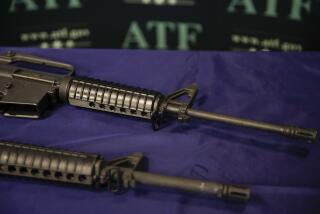Smith & Wesson Pledges Money to Make Safer Guns
- Share via
BOSTON — Smith & Wesson, the nation’s largest gun maker, agreed Monday to set aside 2% of nationwide firearms sales to develop safer guns and to make it impossible for the average 5-year-old to pull the trigger of one of its weapons.
The agreement with the city of Boston mirrors one the company reached in March with the Clinton administration and some other states and cities. It promises external gun locks on new production and internal locks within two years.
About 190 municipalities have sued gun companies in recent years seeking damages for gun violence. Smith & Wesson was dropped from many of those suits after the March pact.
“The agreement with the feds basically got parties speaking about these issues, and it led to us talking to the city of Boston about doing this in a specific lawsuit,” said Smith & Wesson attorney Jeff Nelson.
Boston Mayor Thomas M. Menino called on other gun makers to follow Smith & Wesson’s lead.
“We hope that all these companies will show the same spirit, the same commitment that Smith & Wesson has, that they will follow suit,” Menino said.
Boston filed its lawsuit in June 1999, seeking $100 million in damages from 31 companies for gun violence.
Nelson said Smith & Wesson still faces about 30 lawsuits and hopes the agreement with Boston will encourage settlements in those cases.
The Springfield, Mass.-based company also set out training rules that dealers and distributors must follow to sell Smith & Wesson products.
“This document is not about conditions that make it impossible to do business in the firearms industry, or to keep a legitimate purchaser from buying a handgun,” the company said in a news release. “It is about ensuring that those that obtain Smith & Wesson firearms do so in compliance with the law.”
Most gun makers have been disinclined to settle lawsuits and some have criticized the Smith & Wesson policy, as has the National Rifle Assn.
NRA spokesman Andrew Auarulanandam said the organization had no comment on the Boston agreement.
More to Read
Sign up for Essential California
The most important California stories and recommendations in your inbox every morning.
You may occasionally receive promotional content from the Los Angeles Times.













